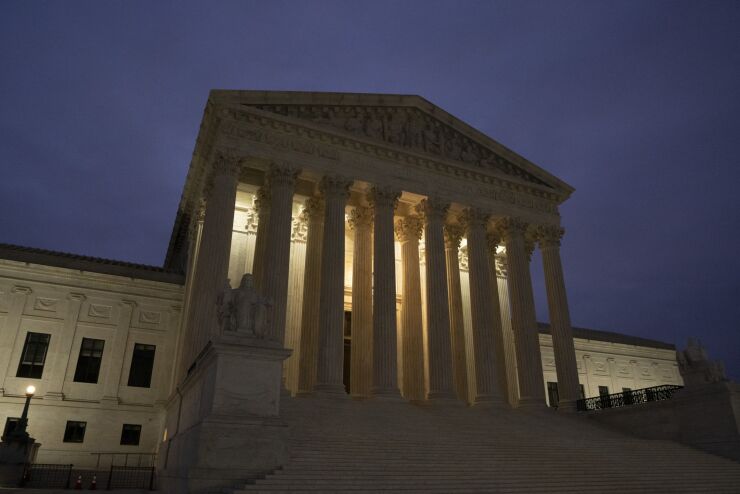The Supreme Court has not yet agreed to hear a challenge to the funding structure of the Consumer Financial Protection Bureau, though the high court could still take the case this term or next.
The Supreme Court on Tuesday did not list
The CFPB case is being closely watched for its impact on not only the agency's own funding structure but those of other regulatory agencies as well. The case also threatens to undo all of the bureau's past actions and rules, depending on how sweeping the Supreme Court's decision ultimately would be if it were to take the case.
In November, the CFPB
The CFPB was created by the Dodd-Frank Wall Street Reform and Consumer Protection Act of 2010, which structured the bureau as an independent agency within the Fed. The CFPB's budget is drawn from the Fed and capped at up to 12% of the central bank's operating expenses. In 2022, the agency's maximum budget was $734 million.
Few experts think the Supreme Court will abolish the CFPB outright. But the 5th Circuit's ruling opened the door for the bureau's 12-year history of rules and enforcement actions to be challenged. Many experts think any Supreme Court decision will lead to a fight in Congress over the CFPB's future funding. Though some banks and financial institutions want the CFPB to be abolished outright, many others are hoping for a ruling that would force Democratic lawmakers to bow to reforms, including funding the agency through congressional appropriations and adopting a commission structure.
The CFPB
"No other court has ever held that Congress violated the appropriations clause by passing a statute authorizing spending," the CFPB said in its petition. The bureau is being represented by U.S. Solicitor General Elizabeth B. Prelogar. The CFPB also said a ruling against it "threatens to inflict immense legal and practical harms on the CFPB, consumers and the nation's financial sector."
The Supreme Court already ruled on the CFPB's constitutionality once. In a 5-4 decision written by Chief Justice John Roberts,
The implications of the current case are less clear, experts say. The Supreme Court has become highly skeptical of administrative agencies and increasingly has sought to assert its power over the other two branches of government,
Many experts think the Consumer Financial Protection Bureau's funding through the Federal Reserve could be the fatal flaw in the Dodd-Frank Act that created the agency, but differentiating the CFPB's structure from others may be tricky.
The 5th Circuit's ruling last year struck down the CFPB's 2017 payday lending rule, which many experts think will never take effect. Two payday trade groups had
The CFPB continues to face legal challenges citing its funding as unconstitutional. Last year,
"The CFPB relies on this unconstitutional funding scheme to carry out its overly expansive UDAAP authority to plaintiffs' detriment," the groups said.






